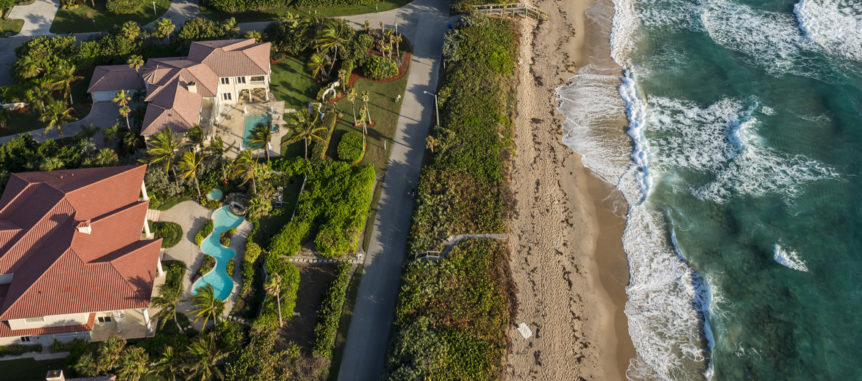Living next to the ocean is a true luxury, but it comes with some added costs – like protecting your home against the salty corrosive air. Luckily there are a variety of things you can do to protect your home, like annual pressure washing, avoiding certain materials, and investing in fiberglass doors and windows.
7 Tips for Protecting Your Beachfront Home
To help you best protect your beachfront home from salt air corrosion, we have prepared a set of tips for you to reference. Some of these you may know, some you may not know. However, if you wish to keep your home protected from corrosion, there are many different potential factors to keep in mind. Let’s go ahead and explore the top tips for protecting your beachfront home.
1. Annual Pressure Washes
In just about any circumstance, you will need to pressure wash your home in order to remove sediments that’ll naturally build up over time. Although, living near the ocean will increase the need for this service. Having a professional contractor do this is usually the best way to ensure that your exterior stays in good condition and that pressure washing does not damage your home.
2. Repaint Your House From Time to Time
In addition to having your exterior cleaned each year with a pressure washer, having your exterior repainted from time to time will add some extra protection to your home. Not to mention, a home looks refreshed after a shiny fresh coat of paint! Usually, you can get away with waiting 3 to 5 years in between each paint job as a beachfront homeowner.
3. Avoid Metal
Metal is almost always a bad idea for your exterior decorations because it is highly prone to corrosion. While metal is a tough material it isn’t advised for areas with high moisture and salinity in the air. Avoid metal wherever possible if you want to extend the life of your beachfront home.
4. Store Smaller Objects Indoors
Certain objects such as cars, bicycles, and so on, should all be stored indoors. Especially objects that contain metal. These will be some of the first things that get heavily corroded by salt air. Therefore, be sure to store as much of your smaller objects indoors in a safe area. For items intended to be left outside – like your patio furniture – invest in materials that are resistant to corrosion.
5. Keep Windows Closed & Routinely Cleaned
The last thing you need is to bring the salty air from the outdoors inside. Therefore, be mindful about keeping your windows closed, at least some of the time. In addition, make sure to have your windows professionally cleaned annually in order to keep them shiny and clear.
6. Use Fiberglass Doors and/or Windows
Fiberglass windows and doors offer a great way to ensure that your home is better protected from salt air corrosion. Fiberglass is a lot more resistant to high salinity than many other comparable materials. Fiberglass is also a lot stronger for beachfront homes in general. Therefore, it’s a solid idea to consider investing in fiberglass windows and doors.
7. Perform Routine Inspections
Perhaps the best way to avoid corrosion is to constantly be on the lookout for damage and the signs of corrosion. Salt air corrosion starts out very noticeable before evolving into serious damage. Therefore, be a little proactive and inspect the exterior of your home on a consistent basis. This will help you immediately pick up on any corrosion so you can take care of it before you actually need to get too worried about it.

